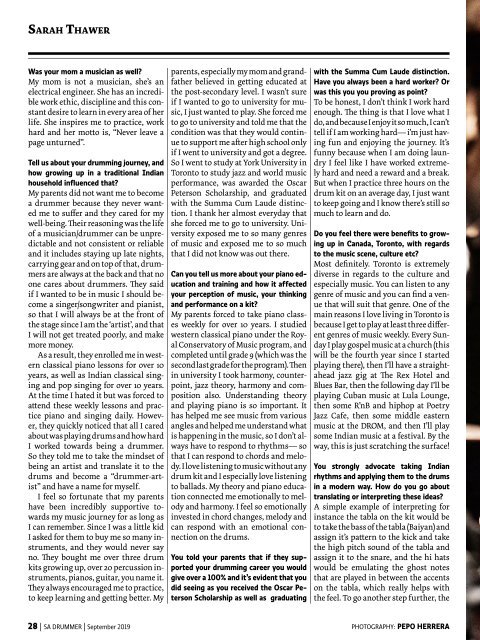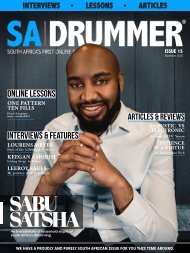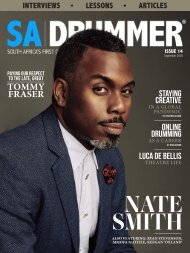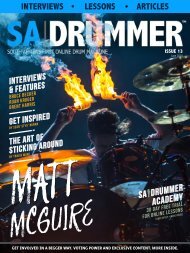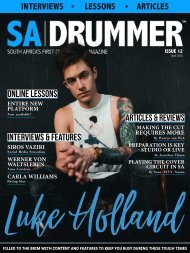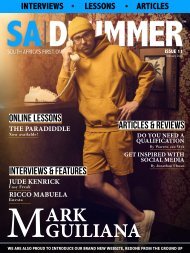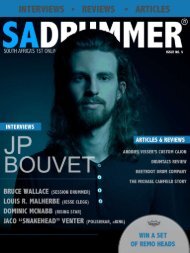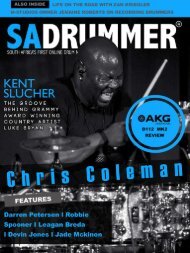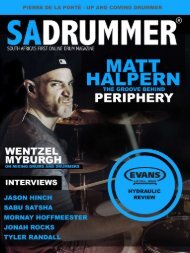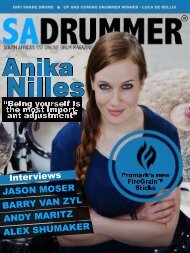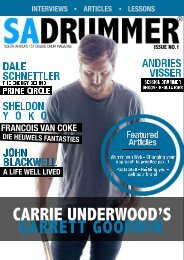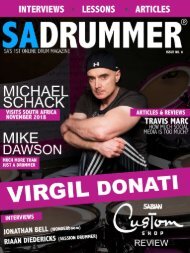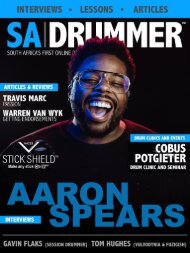Issue 10 - Sarah Thawer - October 2019
Featuring the ‘Drum Guru’ herself, Sarah Thawer, this all-female powerhouse issue comes out hot on the heels of women’s month in South Africa. “It started with listening to the music, on stage & diving into creativity of how I could achieve the sounds not even knowing how to hold a stick correctly.” – Sarah Thawer We went all female for this issue, featuring amazing players such as: • Sarah Thawer • Julianna Mascia • Michaela Isaacs • Marguerite Swart We added articles showing our appreciation for the women in our lives. We touched on whether you should quit your day job to pursue your dreams and we included some new drum lessons and a drum chart for the song “Hero” by Skillet, a band being driven forward by female drummer Jen Ledger. So come check out issue 10 and give all the amazing women in the industry the support and respect they more than deserve. – SA Drummer Team.
Featuring the ‘Drum Guru’ herself, Sarah Thawer, this all-female powerhouse issue comes out hot on the heels of women’s month in South Africa.
“It started with listening to the music, on stage & diving into creativity of how I could achieve the sounds not even knowing how to hold a stick correctly.”
– Sarah Thawer
We went all female for this issue, featuring amazing players such as:
• Sarah Thawer
• Julianna Mascia
• Michaela Isaacs
• Marguerite Swart
We added articles showing our appreciation for the women in our lives. We touched on whether you should quit your day job to pursue your dreams and we included some new drum lessons and a drum chart for the song “Hero” by Skillet, a band being driven forward by female drummer Jen Ledger.
So come check out issue 10 and give all the amazing women in the industry the support and respect they more than deserve.
– SA Drummer Team.
Create successful ePaper yourself
Turn your PDF publications into a flip-book with our unique Google optimized e-Paper software.
<strong>Sarah</strong> <strong>Thawer</strong><br />
Was your mom a musician as well?<br />
My mom is not a musician, she’s an<br />
electrical engineer. She has an incredible<br />
work ethic, discipline and this constant<br />
desire to learn in every area of her<br />
life. She inspires me to practice, work<br />
hard and her motto is, “Never leave a<br />
page unturned”.<br />
Tell us about your drumming journey, and<br />
how growing up in a traditional Indian<br />
household influenced that?<br />
My parents did not want me to become<br />
a drummer because they never wanted<br />
me to suffer and they cared for my<br />
well-being. Their reasoning was the life<br />
of a musician/drummer can be unpredictable<br />
and not consistent or reliable<br />
and it includes staying up late nights,<br />
carrying gear and on top of that, drummers<br />
are always at the back and that no<br />
one cares about drummers. They said<br />
if I wanted to be in music I should become<br />
a singer/songwriter and pianist,<br />
so that I will always be at the front of<br />
the stage since I am the ‘artist’, and that<br />
I will not get treated poorly, and make<br />
more money.<br />
As a result, they enrolled me in western<br />
classical piano lessons for over <strong>10</strong><br />
years, as well as Indian classical singing<br />
and pop singing for over <strong>10</strong> years.<br />
At the time I hated it but was forced to<br />
attend these weekly lessons and practice<br />
piano and singing daily. However,<br />
they quickly noticed that all I cared<br />
about was playing drums and how hard<br />
I worked towards being a drummer.<br />
So they told me to take the mindset of<br />
being an artist and translate it to the<br />
drums and become a “drummer-artist”<br />
and have a name for myself.<br />
I feel so fortunate that my parents<br />
have been incredibly supportive towards<br />
my music journey for as long as<br />
I can remember. Since I was a little kid<br />
I asked for them to buy me so many instruments,<br />
and they would never say<br />
no. They bought me over three drum<br />
kits growing up, over 20 percussion instruments,<br />
pianos, guitar, you name it.<br />
They always encouraged me to practice,<br />
to keep learning and getting better. My<br />
parents, especially my mom and grandfather<br />
believed in getting educated at<br />
the post-secondary level. I wasn’t sure<br />
if I wanted to go to university for music,<br />
I just wanted to play. She forced me<br />
to go to university and told me that the<br />
condition was that they would continue<br />
to support me after high school only<br />
if I went to university and got a degree.<br />
So I went to study at York University in<br />
Toronto to study jazz and world music<br />
performance, was awarded the Oscar<br />
Peterson Scholarship, and graduated<br />
with the Summa Cum Laude distinction.<br />
I thank her almost everyday that<br />
she forced me to go to university. University<br />
exposed me to so many genres<br />
of music and exposed me to so much<br />
that I did not know was out there.<br />
Can you tell us more about your piano education<br />
and training and how it affected<br />
your perception of music, your thinking<br />
and performance on a kit?<br />
My parents forced to take piano classes<br />
weekly for over <strong>10</strong> years. I studied<br />
western classical piano under the Royal<br />
Conservatory of Music program, and<br />
completed until grade 9 (which was the<br />
second last grade for the program). Then<br />
in university I took harmony, counterpoint,<br />
jazz theory, harmony and composition<br />
also. Understanding theory<br />
and playing piano is so important. It<br />
has helped me see music from various<br />
angles and helped me understand what<br />
is happening in the music, so I don’t always<br />
have to respond to rhythms— so<br />
that I can respond to chords and melody.<br />
I love listening to music without any<br />
drum kit and I especially love listening<br />
to ballads. My theory and piano education<br />
connected me emotionally to melody<br />
and harmony. I feel so emotionally<br />
invested in chord changes, melody and<br />
can respond with an emotional connection<br />
on the drums.<br />
You told your parents that if they supported<br />
your drumming career you would<br />
give over a <strong>10</strong>0% and it’s evident that you<br />
did seeing as you received the Oscar Peterson<br />
Scholarship as well as graduating<br />
with the Summa Cum Laude distinction.<br />
Have you always been a hard worker? Or<br />
was this you you proving as point?<br />
To be honest, I don’t think I work hard<br />
enough. The thing is that I love what I<br />
do, and because I enjoy it so much, I can’t<br />
tell if I am working hard— i’m just having<br />
fun and enjoying the journey. It’s<br />
funny because when I am doing laundry<br />
I feel like I have worked extremely<br />
hard and need a reward and a break.<br />
But when I practice three hours on the<br />
drum kit on an average day, I just want<br />
to keep going and I know there’s still so<br />
much to learn and do.<br />
Do you feel there were benefits to growing<br />
up in Canada, Toronto, with regards<br />
to the music scene, culture etc?<br />
Most definitely. Toronto is extremely<br />
diverse in regards to the culture and<br />
especially music. You can listen to any<br />
genre of music and you can find a venue<br />
that will suit that genre. One of the<br />
main reasons I love living in Toronto is<br />
because I get to play at least three different<br />
genres of music weekly. Every Sunday<br />
I play gospel music at a church (this<br />
will be the fourth year since I started<br />
playing there), then I’ll have a straightahead<br />
jazz gig at The Rex Hotel and<br />
Blues Bar, then the following day I’ll be<br />
playing Cuban music at Lula Lounge,<br />
then some R’nB and hiphop at Poetry<br />
Jazz Cafe, then some middle eastern<br />
music at the DROM, and then I’ll play<br />
some Indian music at a festival. By the<br />
way, this is just scratching the surface!<br />
You strongly advocate taking Indian<br />
rhythms and applying them to the drums<br />
in a modern way. How do you go about<br />
translating or interpreting these ideas?<br />
A simple example of interpreting for<br />
instance the tabla on the kit would be<br />
to take the bass of the tabla (Baiyan) and<br />
assign it’s pattern to the kick and take<br />
the high pitch sound of the tabla and<br />
assign it to the snare, and the hi hats<br />
would be emulating the ghost notes<br />
that are played in between the accents<br />
on the tabla, which really helps with<br />
the feel. To go another step further, the<br />
28 | SA DRUMMER | September <strong>2019</strong><br />
PHOTOGRAPHY: PEPO HERRERA


